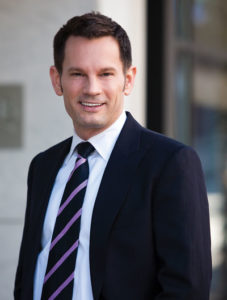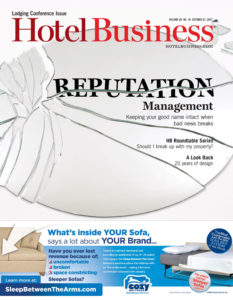On the penultimate night of 1999, as the world was preparing to welcome in the new Millennium, an industry observer was tuned to the local all-news radio station, the clock heading toward the midnight that would usher in Dec. 31. At 11:50 p.m., a small, but dramatic news item hit the airwaves, citing a shooting that had taken place earlier that Thursday in Tampa, FL. Four hotel workers were dead, along with the victim of a botched carjacking, and other hotel employees were injured. The newscaster said the carnage was allegedly delivered by a hotel housekeeper at the Radisson Bay Harbor Hotel.
“Poor Tom Polski,” exclaimed the observer out loud.
Polski, industry veterans will recall, was VP of public relations and communications for Radisson parent Carlson Hotels Worldwide at the time, and the observer knew the New Year was likely not going to be as happy as Polski probably had planned.
Now retired, after 26 years with Carlson, Polski back then was among a growing group of corporate communications experts engaged in the burgeoning field of crisis communications and, subsequently, its offshoot, reputation management.
Today, reputation management seemingly is not an option for businesses, particularly those—like hotels—that are basically open markets for the public. Both internal and external influences can affect perception of a property, a brand, a corporation. Examples abound. A stressed front-desk associate may be abrupt to a guest, triggering a bad hotel review on TripAdvisor or any number of social media platforms. A franchisee of a particular brand may decide there’s revenue opportunity during a natural disaster and raise rates to a price-gouging level. Or a corporation may find itself up against activists who feel it is not doing right by them.
There are any number of horror stories owners, operators and chain execs will exchange sotto voce with one another, but putting them in broad daylight for the public is not a part of the intended conversation. So when so-called “bad news” does hit the spotlight, either on the internet or across the media, most, if not all, lodging entities have protocols in place to ameliorate the particular situation.
One recent example that gained attention concerns antagonism between two groups, which found Marriott International in the middle. ACT for America, a self-proclaimed anti-terrorist group had booked its annual convention at the Crystal Gateway Marriott in Arlington, VA, earlier this month and advocacy group Muslim Advocates vehemently objected to the chain housing the group, urging Marriott President/CEO Arne Sorenson to cancel the booking. At press time, the hotel also was slated to host the 23rd Annual Banquet for the Council on American-Islamic Relations (CAIR) on Oct. 28.
A letter sent to Sorenson by Muslim Advocates took the company to task, stating in part: “Marriott clearly and proudly states on its website that ‘diversity and inclusion is fundamental to our core values and strategic business goals.’ We believe that hosting this anti-Muslim convention is antithetical to this otherwise clear commitment.”
During an interview at the recent Skift Global Forum travel conference, Sorenson defended the company’s right to book not only ACT but CAIR as well.
In referencing ACT, the CEO observed, “The fact that they’re having a meeting with us, or using our hotel, obviously in no respect means we support their point of view or that we’ve made a judgment about their point of view.”
As to CAIR’s annual event, Sorenson said, “When those meetings are held, I get emails from folks saying we’re harboring terrorists, Islamic terrorists, in the hotel. You listen to that and you say: ‘Okay, what can we do about it? What’s the right role that we have?’ You’ve got questions here about what’s practical, what’s legal, but you’ve also got a question about: ‘Is it really our place? Do we really want, as a society, for companies like Marriott and our peers in the industry, others, to sit and make judgments on the point of view of the folks who are staying in or meeting in our hotels?’ … I shudder to think that we really expect that my role, or that Marriott’s role, is going to be to say: ‘You know what? Your views are not acceptable in our hotels, and her views are. Therefore, we’re going to let her make a reservation but we’re not going to let you make a reservation.’”
Muslim Advocates subsequently criticized Sorenson’s remarks and continued to condemn the ACT gathering.
Not every CEO comes to the front lines during bouts of criticism; negativity often gets handled at major chains by corporate communications teams.
“Reputation is the cornerstone of any brand or business. Your reputation is what inspires trust and confidence among your guests and a positive, well-managed reputation is a key component of long-term success. Failing to protect your reputation devalues your brand and, in turn, jeopardizes its future potential,” said Maire Griffin, VP of global communications at Wyndham Hotel Group (WHG).
Major incidents, such as the recent mass shooting in Las Vegas that, by default, drew the Mandalay Bay Resort and Casino into the national limelight, are often all-hands-on-deck when it comes to salvaging a situation. But even minor incidents can snowball and “go viral,” depending on how it’s put out into the public domain. And in a Twitterverse that seemingly wants more and more heads on a plate every day— for even the slightest real or perceived social infractions—hoteliers and operators are finding themselves battling negativity on a variety of fronts.
CEO Tom Magnuson, who counts some 1,000 member hotels as part of his eponymous company, believes a hotel’s online reputation is of utmost importance. Magnuson advises members to Google their own hotels to see what potential guests see and when guests give feedback online—positive or negative—members need to respond. “Review sites like TripAdvisor draw in a huge number of people every day so ranking well is crucial,” he indicated.
The company recently released guidelines for members, emphasizing, “When booking a hotel, Googling and reading reviews is one of the most common steps travelers will take; it has a huge impact on your bottom line. Those hotels that fail to manage their online reputation can seriously harm the number of reservations they’re achieving. It’s not an area that you can afford to [skimp]on.”
Magnuson said there’s basic advice—“a motto”—in place for members facing unexpected situations: “Tell it all. Tell it fast. Own it. Make a change. And move on.” And for good measure, “Don’t avoid things and don’t pass the buck,” he added.
“The longer something lies out there negative, it grows,” said the CEO. “Reputation is like your word, your promise. It’s everything that determines if people will stay with you or not. If each hotel keeps [his/her] word, that globally reinforces the brand.”
Monitoring is only one piece of the puzzle though, said Griffin. “Equally, if not more important, is having a plan for what to do when something does go wrong and you need to respond, be it to your local news station, an upset guest on Facebook, or anything in between.
”We have protocols in place at the corporate level to monitor and protect our brands and the thousands of franchisees who pay us to be a part of them. Triggers for those protocols vary, from an email from a reporter to a tweet from a guest to national news updates on major events and disasters. Regardless of the trigger though, the next step is always the same, which is to execute a previously agreed-to plan that brings together individuals from across the organization to understand immediately and fully what has happened, determine what needs to be done in response and identify how that response should be communicated.”
But sometimes, events occur within a company for which there may not be a specific protocol in place, putting reputation management skills to the test.
Last month, G6 Hospitality’s economy brand Motel 6 found itself under the microscope following a story published in the Phoenix New Times that alleged two of the brand’s locations may have been voluntarily funneling guest information daily to Immigration and Customs Enforcement (ICE) as a matter of course, ostensibly sparking some 20 arrests of undocumented guests between February and August by immigration officials at two Motel 6 properties.
According to the report, ICE agents were showing up basically every two weeks at the reportedly corporate-owned motels located at 4130 North Black Canyon Highway or 1530 North 52nd Drive, which the publication described as located in “predominantly Latino neighborhoods.”
Motel 6 responded the day the article was published, releasing a statement on Facebook and Twitter. The short reply addressing the situation stated: “This was implemented at the local level without the knowledge of senior management. When we became aware of it last week, it was discontinued.”
In an email to Hotel Business, a representative for the brand said it would politely pass on a request to be a part of this article as to how the brand was handling fallout from the Phoenix New Times report, which got subsequent follow-up by numerous other media outlets. “We appreciate the opportunity, but right now, the brand is solely focused on conducting a comprehensive review of our practices,” the email read.
Motel 6 did issue another statement in response to the original news story. It reads: “Over the past several days, it was brought to our attention that certain local Motel 6 properties in the Phoenix area were voluntarily providing daily guest lists to Immigration and Customs Enforcement (ICE). As previously stated, this was undertaken at the local level without the knowledge of senior management. When we became aware of it, it was discontinued.
“Moving forward, to help ensure that this does not occur again, we will be issuing a directive to every one of our more than 1,400 locations nationwide, making clear that they are prohibited from voluntarily providing daily guest lists to ICE.
“Additionally, to help ensure that our broader engagement with law enforcement is done in a manner that is respectful of our guests’ rights, we will be undertaking a comprehensive review of our current practices and then issue updated, company-wide guidelines.
“Protecting the privacy and security of our guests are core values of our company. Motel 6 apologizes for this incident and will continue to work to earn the trust and patronage of our millions of loyal guests.”
In the case of another hotel “going rogue,” the Best Western Plus-Tropic Inn off Highway 77 in Robstown, TX, was cut off from its brand affiliation by parent association Best Western Hotels & Resorts, after allegations surfaced the property was price gouging during Hurricane Harvey, charging up to $300 per night, as displaced residents were seeking what shelter they could.
In advance of the storm, Best Western had issued a statement, proactively advising its hotels on “prohibitions against price gouging, and communicated our position as a brand that compassion be exercised during this time of crisis.”
KXAN-TV News out of Austin had presented investigative findings regarding the property, and the State Attorney General’s office launched a probe into the allegations of price gouging, issuing a subpoena for the property’s records.
“We take reports of price gouging very seriously and immediately contacted the property in question when we learned of this report. The hotel advised they would be reimbursing guests on Aug. 28 all amounts charged in excess of their average daily rate [estimated at about $125]for this time period,” Best Western said in a statement provided to Hotel Business.
In addressing the incident, Best Western issued a statement: “Best Western was founded on the principles of honesty, integrity, compassion, and service. We are deeply offended and saddened by the actions taken by this hotel. As a result, we are immediately severing any affiliation with the hotel. This hotel’s actions are contrary to the values of Best Western. We do not tolerate this type of egregious and unethical behavior.”
But not everyone is equipped to handle reputation management on their own, and what was once a small field of specialized executives, has become big business. And who better to understand hoteliers’ needs than an ex-general manager? That would be Daniel E. Craig, of Vancouver, BC-based reputation-management company, Reknown, celebrating 10 years in 2018.
“TripAdvisor was just coming on the radar as were other review sites, and I recognized how powerful social media and travel reviews were and how disruptive it was going to be to the hotel industry. So I figured hotels were going to need help with this transition,” said Craig.
He apparently figured right. In the past decade, he has worked with hundreds of hotels, including La Quinta, Hard Rock and IHG, crafting any number of protocols, guides and overall directives for how to address/respond to deleterious situations.
Craig recently helped a major hotel chain recover its status on TripAdvisor. “One of their properties’ staff was actually ‘gaming’ the system and writing fake reviews, and TripAdvisor penalized them for it. They lost their ranking and they received a warning badge on their page (which alerts travelers the property is suspected of gaming). They were losing millions of dollars. It was a huge property that did a lot of wedding and group business. People were seeing that warning and booking elsewhere,” said Craig. After a series of probative interviews and discussions with TripAdvisor the executive was able to resolve the situation for the company, getting its ranking restored and the badge removed.
“A lot of what I do is preventative…putting systems, procedures and training into place so that you avoid things happening, and if you do get comments online that are potentially explosive, you deal with it right away in a way that diffuses the situation,” said Craig. “We all know social media people are quick to jump on companies if they feel somebody’s been mistreated. There are endless examples that have just caused so much damage to companies’ reputations, which can take years to recover from.”
WHG’s Griffin said, “The best defense is a good offense. It’s all about planning and giving yourself the benefit of time to think through various scenarios and your potential response to drive the best possible outcome. What you want to avoid is finding yourself in a situation you didn’t anticipate, aren’t prepared for and, literally, have no time to figure out.”
Another aspect of reputation management includes getting coverage for what insurance companies call “reputational harm.”
“You take many years to build up your reputation and it only takes a minute to destroy it. So we provide coverage for crisis management folks to step in to help you deal with media, families, guests, etc.,” said Jackie Collins, senior director/VP-Real Estate & Hospitality Practice for Arthur J. Gallagher & Co. “It’s not going to just respond to small claims; it would be bigger events that could cripple your company.”
Examples would be an active shooter on property or an outbreak of disease such as Legionellosis (aka Legionnaires’ disease).
“You may have to hire attorneys and companies that come in and help you manage press. It covers hiring those professionals. That’s a large expense,” Collins said. “It gives you the tools to fight back against the media before they damage your reputation. You don’t want to get on with the news media and say the wrong things because that [could]damage your reputation further. Due to an adverse media event you [may]need some protection for the revenue you might lose.”
A separate policy could be bought for reputational harm, or coverage may be built into a liability policy.
“What’s really important is having a staff that knows up front not to say anything to anyone until they’re guided to do so,” said Collins. “If you have a reputational harm policy, you’re going to want to contact that insurance company’s claim department and ask them what procedures should you take because you don’t want to invalidate your coverage by doing the wrong thing.” HB







